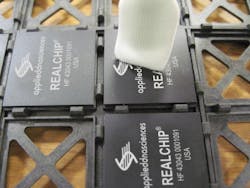Albany, NY and Stony Brook, NY--The College of Nanoscale Science and Engineering (CNSE) of the University at Albany and Applied DNA Sciences (APDN) are partnering to enable nanotechnology to play a critical role in preventing the counterfeiting of computer chips—a collaboration in the groundbreaking area of "nanosecurity" that initially targets the $20 billion defense industry chip market and has the potential to impact nanoelectronics and aerospace markets well in excess of $300 billion. The nanosecurity technique, which uses DNA material, goes well beyond laser-based chip marking of security codes.
Through joint research and development at CNSE's Albany NanoTech Complex, CNSE and APDN, will accelerate the development of APDN's SigNature DNA product that includes new methods for botanical DNA deposition on nanoelectronics wafers—including computer chips, CMOS, MEMS, photonics, and other device derivatives, as well as advanced packaging technologies such as 3D wafer-to-wafer and die-on-wafer—both prior to and during final packaging. The APDN system marks computer chips with uncopyable DNA codes that can then be used to authenticate the originality of chips anywhere along the supply chain, using a variety of chemical and photonic-based DNA sequence analysis instrumentation.
Dean Fuleihan, CNSE Executive Vice President for Strategic Partnerships, said, "The UAlbany NanoCollege is delighted to enter into this partnership with Applied DNA Sciences to enable innovative anti-counterfeiting technology that is vital to protecting American troops and U.S. military interests, both at home and abroad. This collaboration will accelerate research, development and commercialization to ensure the security and integrity of computer chips that drive our nation’s most advanced weaponry and intelligence systems, and further demonstrates the success of public-private partnerships in positioning CNSE and New York state as a hub for 21st century military technologies driven by nanotechnology know how."
CNSE recently submitted a technology development proposal in partnership with APDN and other leading nanoelectronics companies in response to a Broad Agency Announcement issued by the Intelligence Advanced Research Projects Activity (IARPA), which invests in technology programs that have the potential to provide our nation with an overwhelming intelligence advantage over future adversaries.

